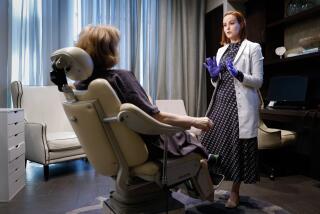Second Time Around : An Unfortunate Trend in Plastic Surgery Is the Rise in Revisions
- Share via
A LOS ANGELES woman, whose nose was noticeably deformed, told a Beverly Hills plastic surgeon that she had had previous cosmetic work done on her nose but the results were not satisfactory. In fact, she told him, she had had nine such operations, the first seven by one doctor. The 10th operation, by her fourth surgeon, was finally a success.
This woman’s case is an extreme example of revisionary cosmetic surgery, the need for which seems to be growing dramatically. Since 1980 the number of elective aesthetic procedures performed in the United States by board-certified surgeons has doubled. Some Los Angeles-area surgeons report that as much as 50% of these are revisions.
Dr. Walter Berman, a cosmetic surgeon in private practice in Beverly Hills and a professor of head and neck surgery at UCLA School of Medicine, says: “More doctors performing cosmetic surgery are not qualified, so we find more and more unhappy people asking to be redone.”
Noses are most frequently revised, he adds. “The nose is a very complex part of the anatomy. Every time you touch one part, it affects another. If the cosmetic surgeon narrows the outside without fixing the inside, the patient can’t breathe properly.”
Sometimes when too much of the bridge is removed, the nose has to be rebuilt. Some doctors use synthetic cartilage; others maintain a human bone bank for this purpose.
But the trend goes beyond nose surgeries. A bad face lift or eye lift can result in prominent scars. Liposuction, now the most popular cosmetic procedure, can remove too much fat, leaving divots. Berman mentions that revisionary surgery is usually more difficult than the initial operation.
Dr. Michael Niccole, a cosmetic surgeon with offices in Long Beach and Santa Ana, founded the Magic Mirror Foundation to provide donated cosmetic surgery to individuals who cannot afford it. He says that of the hundreds of applications received each month, many are from people who need a revision. He cites a woman who lost 25% of her hair because of a poorly executed forehead lift.
Some who ask for revisions have unrealistic expectations, says Dr. Brent Joseph, a cosmetic surgeon in private practice in the Cedars-Sinai Medical Office Towers. “They expected something that wasn’t within the realm of surgical remediation in the first place.”
What recourse does a person have if surgery turns out badly? Reputable surgeons will revise at no charge if the problem is legitimate. “But often a patient loses trust in the first doctor and doesn’t want to go back,” says Dr. Mel Bircoll of Beverly Hills. “Always go back and ask what can be done.”
“Many people are living in quiet desperation, thinking they have to live with bad cosmetic surgery,” Joseph says. “They’ve been told that they have an inherent problem and that nothing can be done. In most cases they can be helped.”
Hair and makeup: Margaret Kimura/Cloutier; model: Leslie Ledezzma/Elite






